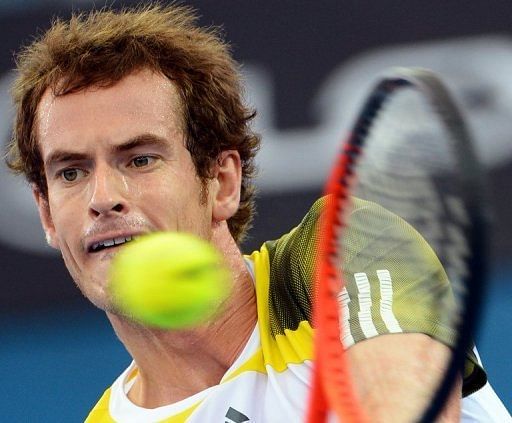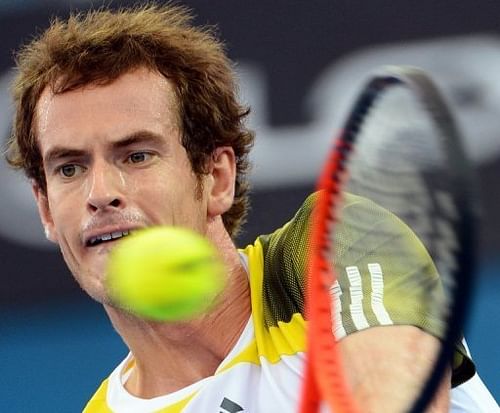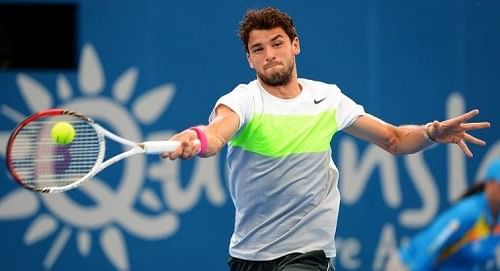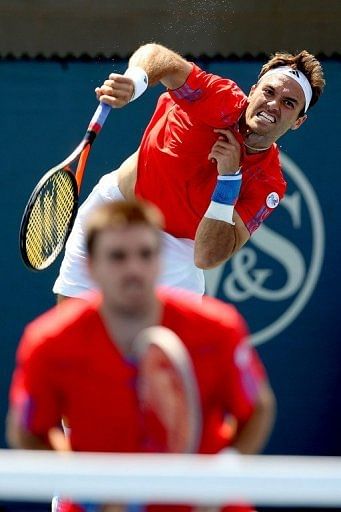
Tennis star Murray finds champion's mentality
BRISBANE, Australia (AFP) –

Andy Murray of Britain hits a backhand return on the way to defeating Grigor Dimitrov of Bulgaria in the Brisbane International final on January 6, 2013. He said he had finally learned the habit of being aggressive after making the perfect start to his season in Brisbane.
Andy Murray said he had finally learned the habit of being aggressive — and curbing his tendency to self-destruct — after making the perfect start to his season in Brisbane.
The Scot, who will seek his second straight Grand Slam title at next week’s Australian Open, said a new mentality had helped him through some sticky moments during Sunday’s Brisbane International final against Grigor Dimitrov.
Murray was rocked by a whirlwind start by the Bulgarian, who was playing his first ATP final, but the Scot quickly steadied himself and came back from 4-1 down to clinch the first set on a tie-break.
The world number three then recovered from going a break down in the second set to take it 7-6 (7/0), 6-4 for his 25th career title.
“I think today was a good example of some of the stuff I worked on in previous years or matches,” Murray said.

Bulgaria’s Grigor Dimitrov hits a forehand during the Brisbane International final against Britain’s Andy Murray on January 6, 2013. Murray won 7-6 (7/0), 6-4 for his 25th career title.
“Like today I got off to not the best start and he was playing very aggressive, and I think by the end of the first set I had turned the tables and I was the one make him do a lot of running.
“I think that’s something that not just in the off-season I worked on… it’s a change of mentality really, and that doesn’t happen in a few weeks. It’s taken time to believe that that’s the right thing to do, to be aggressive.
“That was what I worked on in December, and I worked on it for the majority of last year as well. Did it well today.”
Murray will enter next week’s Australian Open as one of the favourites, alongside holder Novak Djokovic, after winning his first Slam at last year’s US Open. Their task has been eased by Rafael Nadal‘s withdrawal through illness.

Britain’s Ross Hutchins during the Western & Southern Open in Mason, Ohio on August 15, 2012. Murray tearfully dedicated Sunday’s win to “one of my best friends”, telling him “you’re going to get through it”. Hutchins later revealed he has Hodgkins lymphoma, a form of cancer.
Murray, 25, who believes his breakthrough at Flushing Meadows has made him more relaxed as a player, also said he was now better at controlling the angry bursts of frustration which have often flared during his matches.
“I think it depends how much it affects you in terms of duration of time,” he said.
“I mean, if it’s one point, and you get annoyed for 15 seconds afterwards and you can get back to playing the next point with good intensity, then it’s fine.
“When I was younger it used to last quite a long time and it would take me a while to get back into (the match).
“Today, I started the match off badly and came back into it. I had lost serve in the second set and broke back straightaway and won three games in a row to win the match.”
He added: “Sometimes you’re maybe looking to play perfect tennis all the time. That’s never going to happen. It’s something you need to accept.”
A new attitude may be helpful in Melbourne, where Ivan Lendl-coached Murray was a set up and then two sets all against Djokovic in the semi-finals before losing in five.
The Serb then displayed almost incredible mental toughness in the final, when he outlasted Nadal in a nearly six-hour epic which went down as the longest Grand Slam decider of all time.
Murray tearfully dedicated Sunday’s win to “one of my best friends”, telling him “you’re going to get through it”. His former doubles partner Ross Hutchins later revealed he has Hodgkins lymphoma, a form of cancer.